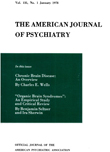NEUROSYPHILIS
Abstract
The use of cardiolipin antigen especially in quantitative serologic techniques is highly satisfactory for the diagnosis and in following the course of treatment in syphilis. Persistent positive serology is not an indication for retreatment.
A positive TPI test with a negative serologic test enables one to make a retrospective diagnosis of syphilis. The exceptions to a diagnosis of "false positive" serology when the TPI is negative are the patients whose syphilis was treated in the early stage before TPI antibody could develop and a few patients with obvious late syphilis. When a chronic "false positive" serology has been identified the collagen diseases should be sought.
We still lack a technique that will indicate the survival of treponemes in the host following treatment.
Six-hundred thousand units of procaine penicillin G given daily to a total of 9 million units is the treatment of choice for neurosyphilis. This may be superseded soon by doses of benzyl amine penicillins half this size, and causing fewer side effects.
The major problem of syphilology now is the increasing difficulty of early case finding and control.
Access content
To read the fulltext, please use one of the options below to sign in or purchase access.- Personal login
- Institutional Login
- Sign in via OpenAthens
- Register for access
-
Please login/register if you wish to pair your device and check access availability.
Not a subscriber?
PsychiatryOnline subscription options offer access to the DSM-5 library, books, journals, CME, and patient resources. This all-in-one virtual library provides psychiatrists and mental health professionals with key resources for diagnosis, treatment, research, and professional development.
Need more help? PsychiatryOnline Customer Service may be reached by emailing [email protected] or by calling 800-368-5777 (in the U.S.) or 703-907-7322 (outside the U.S.).



